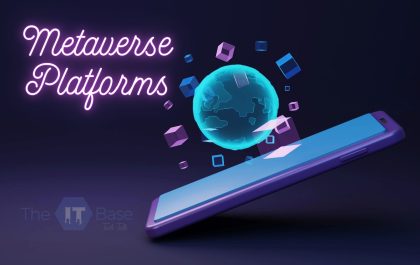Are you enjoying the perks of technology? It has been a real game-changer in 21st century for everyone. People are reaping benefits of online shopping, while businesses are boosting efficiency with tech-savvy tools. Alongside utilizing digital marketing, consider bidding goodbye to ancient business practices and switch to the database instead of saving data to disks.
Data is the foundation of businesses, giving all the wisdom to make correct decisions. Thus, no one can afford to lose confidential information. However, when it comes to saving data, many companies stick to data disks without realizing the security threats in the modern era. Alongside being unsafe, these disks fail to facilitate large sums of data. In this digital world, companies are solely dependent on structured and unstructured data. Whether in the form of social media likes, website visits, or traffic – every company is collecting data.
The database management system allows users to define, innovate, control, and create tons of data. It also lets the end-users create and delete data in the database, promoting accessibility. It gives you an insight into changing tastes and trends by leveraging historical data. Similarly, all the sales records can identify loyal and valuable customers of your business. You might have to familiarize yourself with the tips and tricks, but the results will be worthwhile.
If you are still skeptical about it, have a look below. Here are all the reasons why you should use a database instead of saving data in a disk.
-
Table of Contents
Reduces Redundancy
Brace yourself for some overwhelming challenges of the digital world. You would find yourself generating heaps of data, but do you think all of it is useful? Of course, not. Sorting out relevant data can be quite time-consuming, but not when you are using database management products as it can detect redundant data instantly. It contains files across different locations, which means you won’t be saving multiple copies of the same file.
It uses normalization to reduce redundancies in the database – a process with guidelines that design databases and reduce redundant data. You can create standard forms to list the things you want from data and generate tables. It will ensure that there is no chance of data duplication. Besides, you can integrate other software to consolidate data from multiple sources, making it more accessible for market and industry analysis.
Also Read: Proxies are a Great Tool, but What about Automated Solutions?
-
Higher Security
With the advancing world, hackers are also getting smarter, meaning breaking into ancient systems has become easier than ever. Instead of putting confidential information at risk by storing in data disks, databases offer top-notch security. Unlike a data disk that is accessible by everyone, the database system gives access to authorized users. It follows user-verification, where users have to sign in through their username and password, closing doors for breaches.
Likewise, you can also protect the database through security firewalls, which denies access to traffic by default. The authorized users would come through specific applications and web servers. For instance, you can limit access to office laptops, meaning employees can’t open a database anywhere else. Unsurprisingly, this won’t be possible with a data disk since there are no locks of security measures. Also, if you make the decision not to use any of the hard drives that have important data on them, make sure to dispose of them properly through a company that provides hard drive destruction services.
-
Automatic Backups
What if your hard disk gets attacked by a malware or virus? Unfortunately, it can cost you all the valuable data that you have been collecting for years. Surprisingly, you can eliminate this threat with the help of a database system. It automatically takes care of backup and recovery without bugging you with alerts to backup data. It is the process of creating duplicate copies of the database, which are only available if the system crashes.
Even though it follows strict safety protocols, if some malware pops up and corrupts it, you can access the backup file immediately. It also ensures the company’s compliance with government regulations as businesses have to maintain access to essential data in case of a disaster or technical problems.
Also Read: Headed to IT School? Don’t Fall for These 5 Myths

-
Data Sharing & Accessibility
In today’s era, employees are looking forward to flexible working spaces. Instead of emailing large files, which can take hours – it is imperative to prioritize efficiency. In a database, the authorized users can share the data among themselves. If one employee gets stuck in-between analysis, they can immediately send the file to another person. Whether he sits in the next room or one corner of the world, it would be accessible in seconds.
With this flexibility, companies can create a remote workforce and bring professionals from all around the globe. After all, employees need an internet connection and authorized access to the system. It lets you view different search queries, allowing users to access the one that benefits them the most. For instance, if your finance manager needs information about funding or the HR manager wants to see appraisals – everything is a click away. All employees would appreciate this as they get the information at one glance, eliminating the need to surf through all files.
-
ACID Consistency
Are you wondering what ACID is? It refers to atomicity, consistency, isolation, and durability. It works like a guarantee, making sure all the database transactions are credible, and the information in the database remains accurate and consistent despite any failures. Most importantly, it includes a rollback of an update that seems complex, especially when files get stored outside the WordPress database. Here is how consistency can make a difference in saving data.
- Atomicity –guarantees that either all transactions will succeed or none.
- Consistency – It ensures that all the data would be valid and will align with the pre-set rules.
- Isolation – All transactions occur in isolation, meaning no operation affects the other one.
- Durability – The transaction committed even if the system fails right after it. All the changes in the operation will be stored permanently.
It lays a foundation for the database to ensure data doesn’t become corrupt due to crash or cyberattack. After all, this consistency certifies the data is the same for everyone, making sure all employees are on the same page.
Also Read: 4 Steps to Setup Push Notifications On React Native Cross-Platform Apps
Wrapping Up:
Managing information is all about making it accessible for everyone who needs it. A database promotes accessibility in organizations as workspaces become more integrated. You will find employees sharing files and helping each other, leading to a collaborative workspace, which wasn’t possible if you were saving data in a disk. Similarly, it facilitates a mass amount of data while reducing redundancy. With all these incredible benefits, you have no excuse to skimp on the database management system.
TheITbase
Related posts
Hot Topics
Metaverse Platforms for Virtual Workspaces
Ever felt like your office is stuck in the Stone Age? Tired of endless Zoom calls that feel about as…
IoT Protocols: The Language of Smart Devices
Ever wonder how your smart fridge talks to your phone? Or how does your fitness tracker know to buzz when…



